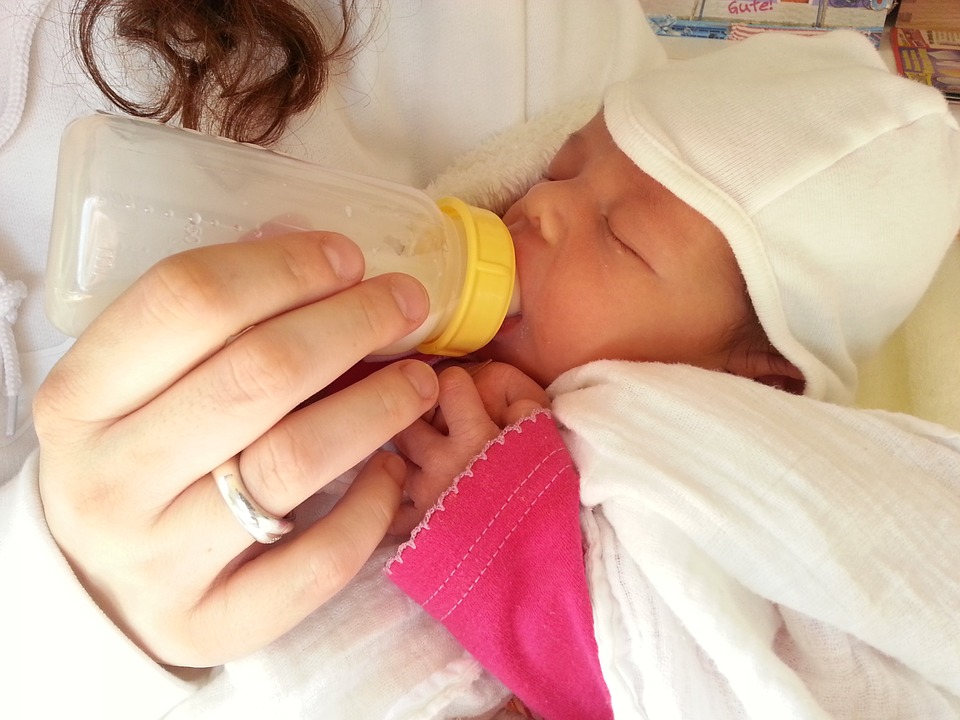It can be alarming when a baby spits or throws up, but even more concerning is when a baby throws up mucus. For the most part, spitting up some mucus isn't anything to worry about. Spit-up and throw up in infants under one year is a normal occurrence. Mucus may signal a few different things and this article will help you understand the cause, tips to reduce it, and when to call your doctor.

Why Is Your Baby Throwing Up Mucus?
Normally in older children and adults, the food and things we drink go into our stomach through our esophagus and stay in our stomach to be digested by the acids our stomach secretes. Once broken down, the food goes on into the intestines so the nutrients can be absorbed by the body.
When you see a baby throwing up mucus or undigested formula, it's due to the small valve that closes the esophagus. This valve is not fully formed. This allows undigested food, milk, or even mucus to pass back up through the mouth. This is often due to overfeeding, air in the stomach from not being burped, or even too large a nipple size that sends the milk down too fast. As your baby gets older, the valve tends to get stronger and eating solid foods will help things stay down.
In some cases, food, or formula allergies may cause a mucus buildup in the stomach due to irritation. Some of the different causes of this can include:
1. Cold/Allergies
Babies can spit up mucus if they have a cold or allergies causing excess mucus production in the nose or the throat. Babies tend to swallow any secretions that come from their nose and it can cause them to spit it up.
2. Fast Milk Flow
If you have too much breastmilk or your milk lets-down too fast, your baby may get too much at once and spit or throw up. While breastmilk is thinner than formula, it can also have a mucus like appearance. Formula tends to curdle in the stomach and may have a mucus like appearance if the curds didn't have time to form.
3. Gastroesophageal Reflux Disease (GERD)
GERD in babies is actually common and cases are on the rise. This happens when the esophageal sphincter is too weak to hold milk and stomach acids down plus, they tend to have excess stomach acid production.
4. Pyloric Stenosis
This is a rare condition that causes the pyloric sphincter to tighten up. A small pouch is created that does allow milk to enter, but is quickly ejected in something known as, projectile vomiting. Babies can quickly become malnourished and/or dehydrated so the condition requires surgery as soon as it's diagnosed. It shows up around 3 to 6 weeks of age and can rarely occur up to 3 months of age.
5. Food Allergies
When babies are allergic to something in your diet or their formula, they may throw up mucus. This is a natural reaction to something that is irritating their tiny tummies. Formula allergies to soy and cow's milk are common. Also, have you tried new foods lately? These immature little digestive systems may have allergies to certain things that they do outgrow in time.
6. Teething
Babies who swallow an excessive amount of drool may appear to spit up mucus. Drool tends to be clear and stretchy so it looks like mucus.
How Can You Help/Prevent It?
A baby throwing up mucus can be alarming, but it may just be a common reaction to something simple that can be fixed easily at home. Try these tips to help if this happens:
1. Make Dietary Changes
If you are breastfeeding, try eliminating common allergens in your own diet. Avoid dairy products, soy, nuts, and certain types of berries. Try an elimination diet eliminating these things and add them back in one by one after a week. See what may be upsetting baby's tummy and eliminate that from your diet completely while breastfeeding.
2. Try Less Feeding More Often
If your baby has reflux, try feeding less formula or breastmilk each feeding. Just make sure you feed more often so your baby gets enough fluids. A good rule of thumb is one-ounce per hour as a minimum.
3. Ask About a Formula Switch
If your baby takes cow's milk based formula, you may need to switch to soy formula. If your baby is on soy formula, you may need to switch to a cow's milk based formula. In a few rare instances, babies can be allergic to both and need a special hypoallergenic formula.
4. Try Smaller Nipples
You may need to switch to a lower flow nipple to prevent the milk from going in too fast. If you are breastfeeding and your milk lets down too fast, you may need to allow yourself to "let down" into a towel and then begin the feeding.
5. Burp Baby Often
If your baby is spitting up frequently with feedings, make sure you burp often. Try burping after every ounce or even half ounce depending on how much they throw up.
6. More Tips to Help
You can help prevent baby throwing up mucus by using these techniques with each feeding:
- Feed baby in an upright position
- Feed in a quiet and calm environment
- Don't put pressure on your baby's tummy
- Keep baby quiet after each feeding
- Have baby stay in a reclining position for 30 minutes after feeding
When to Worry
The following things need to be checked by a doctor:
- You notice your baby chokes on mucus after throwing up
- Your baby throwing up mucus with a rash or hives
- Mucus that interferes with baby's breathing
- Projectile vomiting more than once per day
Except for projectile vomiting, the good news is that if baby is gaining weight and has 6 or more wet diapers per day, there isn't usually anything to worry about.
